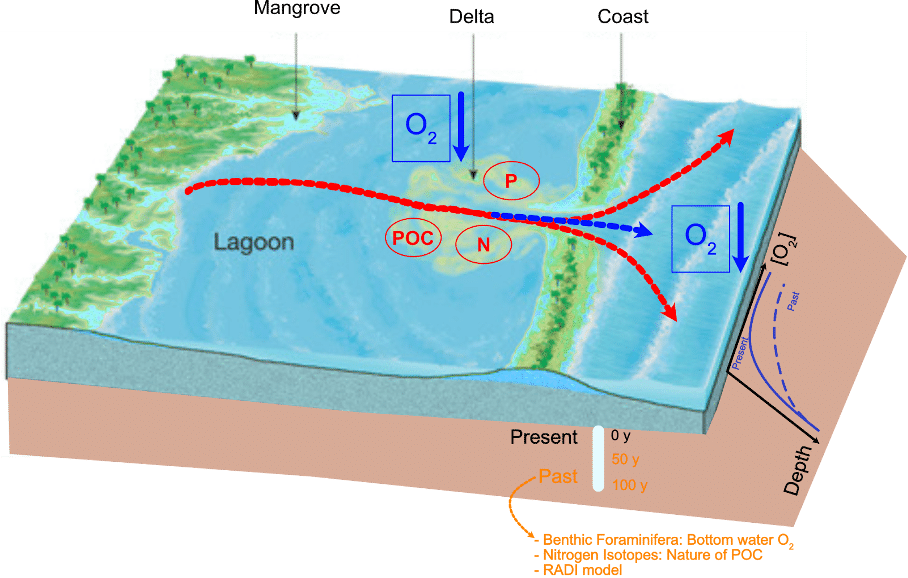LEFE CYBER MANGO
Coastal marine ecosystems, particularly in tropical areas, are under considerable pressure from climate change and human activities. Water stratification, exacerbated by global warming and increased microbial respiration, is leading to the gradual deoxygenation of sub-surface waters. Not only does this disrupt biogeochemical cycles, it also threatens biodiversity and the fish stocks that are essential to local populations.
The coasts of Senegal are facing a gradual extension of anoxic zones, particularly in coastal regions near mangrove lagoons. The massive input of organic matter by mangroves, combined with the deoxygenation induced by global warming, is profoundly altering biogeochemical balances. These disturbances can lead to a reduction in the quality of fish stocks and have a negative impact on local fishing, a vital sector for the regional economy. Despite the importance of these issues, the mechanisms and evolution of these processes remain largely unknown in this context.
The MANGO project aims to shed light on these complex phenomena by studying changes in oxygen content and nutrient cycles in Senegal's coastal zones, with particular emphasis on the influence of mangroves.
MANGO's main objective is to reconstruct the history of oxygen levels over the last century and to unravel the mechanisms responsible for its variations. More specifically, the project aims to understand..:
- How has oxygen content changed over the last century along the Senegalese coast?
- How much of the observed change is attributed to oceanic changes and how much to changes in the mangroves in the lagoons?
To answer these questions, MANGO is adopting an integrated, multidisciplinary approach:
- Fieldwork and sampling
Sediment cores and surface sediment samples will be taken from two key sites, located at the mouths of the Mbodiène and Joal-Fadiouth lagoons. These samples will be used to reconstruct oxygen dynamics over a hundred years or so, as a function of local and oceanic variations.
- Biogeochemical analyses
Precise measurements of oxygen, pH and temperature will be taken in the field. In the laboratory, the study of stable isotopes of carbon (δ13C) and nitrogen (δ15N) will provide robust indicators of the origin and evolution of organic matter, as well as denitrification processes.
- Study of benthic foraminifera
These micro-organisms, which are sensitive to oxygenation conditions, will be used as bio-indicators to reconstruct the history of environmental variations. A low-cost imaging system (SASHIMI), combined with AI annotation and morphometric analysis tools, will be deployed to automate species identification and quantification.
- Sediment modelling
By calibrating a sediment model (RADI), the data collected will be integrated to simulate the dynamics of oxygen gradients in sediments. This modelling will make it possible to identify the dominant processes (degradation of organic matter, inputs from mangroves, mineral precipitation) and to predict their future evolution.
The MANGO project aims to provide a better understanding of the biogeochemical processes influencing Senegalese coastal ecosystems. By shedding light on the interaction between mangrove inputs and oceanic conditions, it will contribute to :
- Preserving fish stocks and implementing sustainable management strategies.
- Building local capacity in quantitative micropalaeontology and environmental modelling.
- The development of international scientific collaborations, encouraging North-South and South-South exchanges.
MANGO is also in line with the priorities of the ECLAIRS 2 LMI and is actively involved in the IRD's initiatives to promote sustainable science and combat the effects of climate change.
2025-2027: MANGO (LEFE CYBER)
CEREGE lead :
Sonia Chaabane (PI)
Olivier Sulpis (co-PI)
Impact of Mangroves on Lagoon Eutrophication and Coastal Water Deoxygenation in Senegal
Collaborators at CEREGE :
- Thibault de Garidel-Thoron
- Laetitia Licari
- Guillaume Leduc
- Anne-Lise Jourdan
External collaborators:
- Malick Thiam, UCAD Senegal
- Amadou Thierno Gaye, UCAD Senegal
- Eric Machu, IRD, LOPS, Ifremer Brest, France
- Ibrahima Camara, UCAD Senegal


